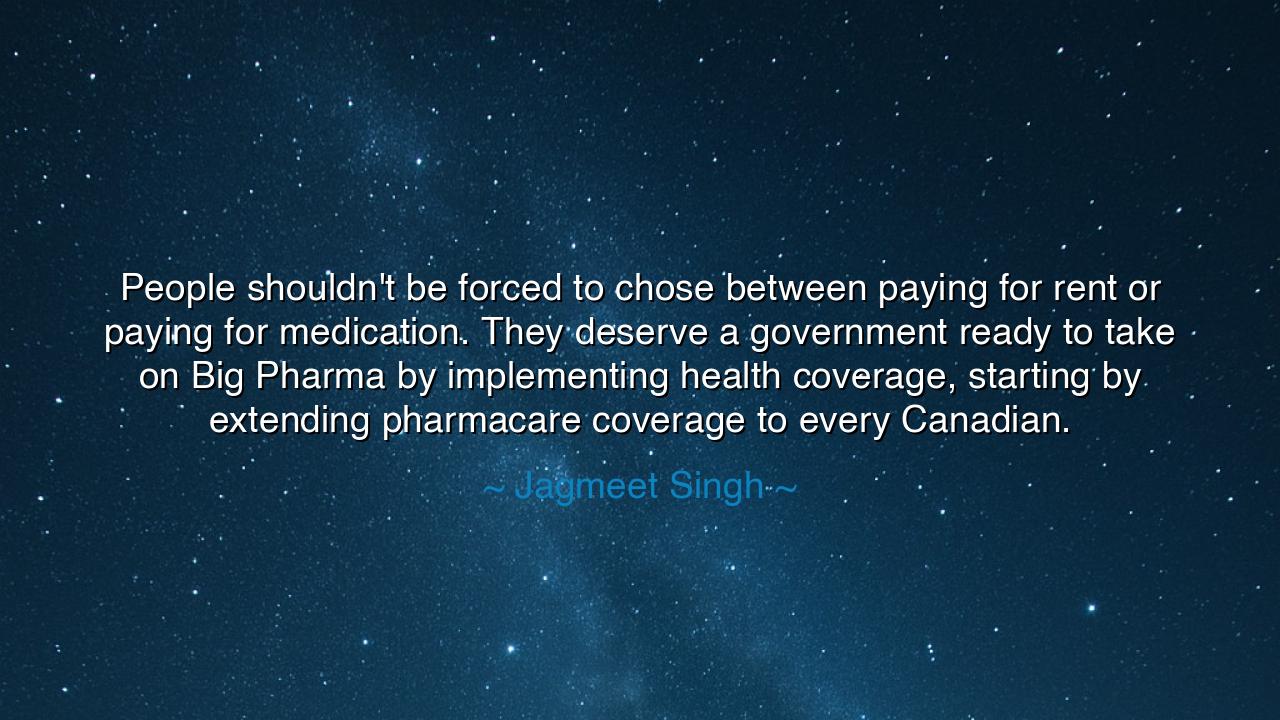
People shouldn't be forced to chose between paying for rent or
People shouldn't be forced to chose between paying for rent or paying for medication. They deserve a government ready to take on Big Pharma by implementing health coverage, starting by extending pharmacare coverage to every Canadian.






“People shouldn’t be forced to choose between paying for rent or paying for medication. They deserve a government ready to take on Big Pharma by implementing health coverage, starting by extending pharmacare coverage to every Canadian.” – Jagmeet Singh
In these bold and compassionate words, Jagmeet Singh, leader and advocate for social justice, speaks to one of the oldest moral imperatives in human history: that no one should have to suffer for the right to live. His voice, though rooted in the politics of our age, echoes the timeless wisdom of every society that has wrestled with inequality — the conviction that a nation is judged not by the wealth of its few, but by the wellbeing of its many. Singh’s call is both plea and challenge: a demand that governments rise above greed, that they serve not the powerful corporations, but the people who depend upon them for survival.
For what does it mean, he asks, that in lands of abundance, citizens must choose between rent and medicine? Such a choice is no choice at all, but a silent injustice — the cruel arithmetic of poverty that weighs a roof against a heartbeat, a home against health. The ancients would have called such a society diseased, not in body but in spirit. In the wisdom of old, kings and leaders were charged with ensuring that no one starved, that the healer’s hand was never denied to the poor. In Singh’s words, this same moral duty is reborn for the modern age — a call for pharmacare, for universal access to medication, that the right to live might never again depend on the size of one’s purse.
He names the adversary plainly: Big Pharma, the titan of modern commerce, whose power reaches across nations and whose profit is drawn, too often, from the suffering of the sick. To “take on Big Pharma,” as Singh proclaims, is to challenge a modern empire — not of armies, but of influence. Like the merchants of old who hoarded grain during famine, these corporations have learned to turn necessity into luxury, to place a price upon human endurance. Singh’s words rise as a rebuke to such greed, declaring that life itself must not be for sale.
Consider the story of Tommy Douglas, the father of universal healthcare in Canada — a man once ridiculed, resisted, and reviled for daring to dream that medical care could belong to all, not just the privileged. His vision was born from compassion and fortified by courage; and though the forces of profit and fear stood against him, his perseverance transformed a nation. Singh’s call to expand pharmacare continues that sacred work — the next frontier in Douglas’s legacy, extending the same principle to the medicine cabinet as once to the hospital ward. It is the ancient struggle reborn: between the guardians of compassion and the merchants of power.
Yet Singh’s words reach beyond policy — they touch the heart of what it means to live in community. To him, a government’s purpose is not to protect wealth, but to protect people. It is the duty of leadership to shield its citizens from cruelty, whether that cruelty comes from sword, sickness, or system. The choice between rent and medication is not just economic — it is moral. It forces the vulnerable to sacrifice one necessity for another, a sacrifice no society should demand. True progress, he teaches, is measured not in markets, but in mercy — in the number of lives uplifted rather than the number of profits gained.
The ancients would have understood this well. In the days of old, wise rulers were honored not for their riches but for their compassion. The Egyptian pharaohs built granaries to feed the hungry in drought; the emperors of China were judged by the harmony of their people, not the size of their treasure. Singh’s vision flows from that same eternal river of justice: that the health of a nation depends not on wealth hoarded at the top, but on care extended to all. Health coverage, then, is not merely a political proposal — it is a moral covenant, a declaration that every life is sacred, and that society must stand as one in defense of the weak.
Therefore, children of the future, take this lesson to heart: compassion is the truest form of strength. When a nation allows its people to suffer for lack of medicine, it forfeits its honor. Demand leaders who place the lives of the people above the greed of the powerful. Stand together, for justice is not a gift from rulers but a creation of the people’s will. Support those who build systems of care, who dare to challenge giants in the name of humanity.
And so let Jagmeet Singh’s words endure as both warning and inspiration: no one should have to choose between home and healing. The time has come for courage over comfort, for justice over profit, for empathy over indifference. For when the sick are cared for, when no soul is left to suffer alone, then — and only then — shall a nation be truly well.






AAdministratorAdministrator
Welcome, honored guests. Please leave a comment, we will respond soon